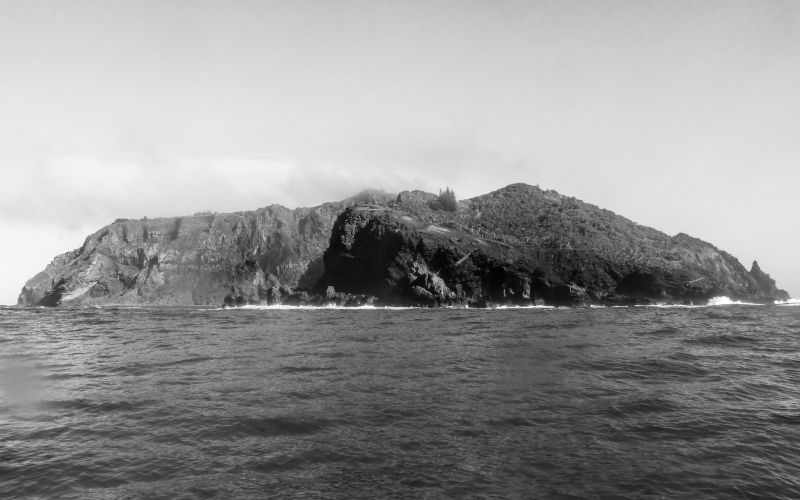A Tahitian Legend of Hituaurevareva
Before Pitcairn Island was settled by the mutineers of HMAV Bounty and their Tahitian partners, it had been populated before by Polynesians and there are legends about the island. The Tahitian women that were with them knew of the island from legends and its older name, Hitiaurevareva.

Before Pitcairn Island was settled by the mutineers of HMAV Bounty and their Tahitian partners, it had been populated before by Polynesians and there are legends about the island. On arrival the mutineers found evidence of polynesian settlements in the form of marae and statues. The Tahitian women that were with them knew of the island from legends and its older name, Hitiaurevareva.
The following is a legend, from the book "Ancient Tahiti" by Teuira Henry, which tells of a chief of Hitiaurevareva living on Tahiti called Tū-i-hiti, who marries a Tahitian woman, Hau-vana'a. They leave Tahiti to go back to Hitiaurevareva to live, on the way passing a number of creatures of the sea. These same creatures are mentioned in later legends, including that of Rata and his journey to Hitiaurevareva, which I'll write about another time. Here's the legend recounted from Henry's book:
Matamata-taua and Tumu-nui of North Tahiti had a daughter, Hau-vana'a whom King Tū-i-hiti took as a wife but she did not care for him. She turned away pining for her parents, and the the parents withdrew her from him.
The love pieced the heart of Hau-vana'a and she fretted for Tū-i-hiti. And the parents said to him, "Your wife has become attached to you." And so he went to his wife, and she enquired:
"Where have you been, King Tū-i-hiti? I have been weeping for you!" The husband replied:
"Why have you been weeping for me? I remained a long time with you, and you did not speak kindly to me, so that you see the hair of my head has partly fallen out from grief. Now this is what I wish to say to you, my wife, I am taking leave of you, and am returning to my home in my country." The wife replied:
"Do not forsake me!" The husband said:
"Ah, it rests with yourself, my wife. Do you wish to go with me to my home to dwell?" The wife wept freely and she said:
"Yes, but I must first bid farewell to my parents."
So she went to her parents still in tears, and her father suspecting that her husband has beaten her said:
"Hau-vana'a, who has been beating you? You have been a princess with me, no one daring to assault you." The daughter replied:
"I have not been beaten." and she told them everything, stating that she and her husband were going away to his land, to Hiti-au-revareva. Tumu-nui replied:
"I told you, my daughter, not to spurn your husband, that he was a king from Hiti and you might thus send him back there. Now, your country men would be lost in this voyage; many are the foes of the deep. There are, Pu'a-tū-tahi, Ahifa-tu-moana, 'Are-mata-roroa, Are-mata-popoto, Pahua-nui-api-t'a-i-te-r'ai, Anae-moe-oho, Tupe-io-ahu, and 'Otu'u-ha'a-mana-a-Ta'aroa! And now my daughter, do not go; stay here with us, your parents." The daughter answered:
"I shall by no means stay." The father said:
"Will you not weep for me and your mother?"
"I shall weep, but I should weep more for my husband." she replied.
"Go" said he, "You have a royal will; you cannot be persuaded to stay." So the daughter went to her husband, and the king said to her:
"Have you properly considered the matter, Hau-vana'a, to go with me to my country?"
"I will go with you", she said, but the husband said:
"Here is what I would say to you, my wife. Stay here in your country, and behold your parents, your clan, your mountain, and hear your praises." The wife answered:
"I shall by no means stay." The husband continued:
"But no, my sister, parents and country would cause regret as soon as they become lost to you and me in the distant haze. No, my sister, your eyes then would not again see this land!"
"I will go with you!", she said. And so the husband consented, and he said to her:
"Put together our clothes and bedding."
And King Tū-i-hiti went to prepare his canoe, which was a great double one, and to take in provisions for the voyage, while his wife made preparations at home to accompany him, amid the deep regrets of her parents and all their kin and people.
The canoe was named Are-mata-roroa, and when everything was made ready, one morning King Tū-i-hiti and his queen, accompanied by their respective personal attendants, bade farewell to all in Tahiti and set sail for the far-off land. They sailed to the south-east, bearing up against a stiff breeze, and were soon out of sight of Tahiti.
Queen Hau-vana'a was made comfortable in a cozy little thatched awning set upon planks that were fastened across the twin canoe near the bows. In attendance on her were two faithful women of her mother's retainers, and they became the more attached to one another as the sea divided them from their much loved Tahiti. The hardy men found comfortable resting places in different parts of the canoe, and everything bade fair to make their voyage a pleasant one.
They were two days out at sea, when they heard in the distance a roaring sound, and soon they saw the mid-ocean atoll, called Pu'a-tū-tahi (Hereheretue, Saint Paul Island), with the surging sea breaking in ever-varying sprays as it caught the breeze. And from amid the deafening roar, they heard a voice that came from the spirit of the coral, and the following conversation ensued:
Rock: There is a canoe approaching!
Tū-i-hiti: It is 'Are-mata-roroa. Who is that foe speaking?
Rock: It is I, Pu'a-tū-tahi.
Tū-i-hiti: Why do you roar at my canoe?
Rock: O King Tū-i-hiti, where is your wife, Hau-vana'a?
Tū-i-hiti: Here in the canoe.
Rock: This is what I have to say to you, my king, Tū-i-hiti. Throw her into the sea, to stimulate my vitals. Pain still remains in your heart from the slights that this wife has shown you.
Tū-i-hiti: Pu'a-tū-tahi, I cannot part with her! I love my wife, in proof of which she was the cause of my hair partly falling out! It was this woman! But give heed to me. Should yonder king, Tumu-nui, prepare his canoe to come for his daughter, when he arrives here where you are, hold him back.
Rock: Go on, my king.
Tū-i-hiti sailed on, and when the mid-ocean island was out of sight he saw lying on the waves Ahifa-tu-moana, and as it caused the sea to splash up into his canoe, he enquired who it was that was wetting him.
"It is I, Ahifa-tu-moana," replied the monster. And the same conversation took place between them as with Pu'a-tū-tahi, and the king was allowed to pass unmolested.
Then they met 'Are-mata-roroa and 'Are-mata-popoto, which came dashing against the canoe to break it, and Tū-i-hiti said: "Ia haehaa te pae'au 'are" (Let the billowy side come low). The wave spirits enquired after the young queen in the same manner as in the preceding interviews and received the same answer. Then the sea became calm and the canoe passed safely on.
They next saw the terrible Tridacna opened out from east to west to entrap them. But Tū-i-hiti exclaimed:
"Oh Pahua-nui-api-ta'a-i-te-ra'i! This is I, Tū-i-hiti, let me pass!" and the Tridacna also enquired for the queen, desiring to devour her, but the king refused to give her up for the reason before mentioned, and they were allowed to pass on.
Soon after this appeared the Ana'e-moe-oho, which Tū-i-hiti accosted and passed in the same way. Early one morning, the canoe approached a long rocky atoll, called Hiti-tautau-mai, of which 'Otu'u ha'amana-a-Ta'aroa was the god. The great stork approached the canoe and commenced to peck furiously at the bows. So the king said:
"O vai teie toa?" (Who is this foe?) Then they exchanged the same words, with the same result as on former occasions, and the stork left them in peace and flew away into the shoals of his lagoon in search of fish.
Finally, while the canoe was passing the angular coast of that island, from the shoals came Tupe-io-ahi, intent on seeking the life of the young queen ; but when her husband gave the beast the password, he was satisfied and let them go unmolested. Thus all the dangers of the voyage were passed, and the travellers went on their way rejoicing.
They next sighted the hilly islands of Hiti-poto (Mangareva), so called in contradistinction to Hiti-roa (old name of Tahiti), and soon entered the smooth lagoon encircled far out by a friendly reef. They were cordially received by friends known to them in Tahiti, with whom they remained several days and from whom they obtained fresh provisions.
Soon they passed an atoll named Hiti-tautau-atu (Timoe, Crescent Island) and at length they approached the shores of their destination, the picturesque and then populous little mountainous island of Hiti-au-revareva (Pitcairn Island), the kingdom of Tū-i-hiti and future home of the daughter of one of Tahiti's highest chiefs.
As the royal canoe approached the sea-beaten coast of this land, beyond the limits of the coral reef the loving subjects assembled from all directions to meet their long-absent king and new queen ; and stalwart men went out into the foaming sea to bear the canoe high on on to the shore in a little cove secure from the approach of tide and breakers. The young queen found that little island of fertile soil well filled with fruit trees, coconuts and other plants, the same as in her native land.
The happy pair were welcomed home with songs and feasts and invocations according to the custom of their time. There they lived long and happily together and had numerous issue. But they never returned to Tahiti, where the history is recorded only in legend.
Discuss this post on the /r/strandedio subreddit.
